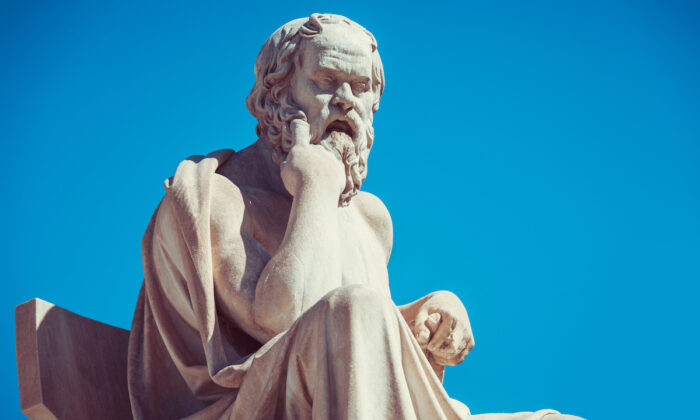Understanding Plato's Allegory of the Cave
I felt if I was going to create a film as a modern interpretation of the allegory, I should do my research and really break down the story so I don't lose the key components of it. So, I'm going to go over the events before the story, the story itself, and its affect on society to this day.


Before The Story
 In the story Plato says that the person narrating is Socrates, his old teacher who was executed by the Athen government for "corrupting the minds of Athen youths." According to my english teacher he was apparently offered either death or exile and he chose death. Most people think of Socrates as a voluntary scapegoat since he chose this way and it points to him being something of a martyr. In reality Socrates was moreso a preacher of free and individual thinking, which the government did not appreciate and actually falls in line with the theme I want my films to have this year. Plato released the story saying that they were Socrates words and not his own, to avoid his own execution I'd assume. After learning all this and the actual content of the story itself, I realized this would be perfect to use for my theme.
In the story Plato says that the person narrating is Socrates, his old teacher who was executed by the Athen government for "corrupting the minds of Athen youths." According to my english teacher he was apparently offered either death or exile and he chose death. Most people think of Socrates as a voluntary scapegoat since he chose this way and it points to him being something of a martyr. In reality Socrates was moreso a preacher of free and individual thinking, which the government did not appreciate and actually falls in line with the theme I want my films to have this year. Plato released the story saying that they were Socrates words and not his own, to avoid his own execution I'd assume. After learning all this and the actual content of the story itself, I realized this would be perfect to use for my theme.The Story
It's been about two months since I read the story in my english class so I decided I'd go on YouTube and get a recap on the basic idea of the story. I ended up finding a YouTube video by Wisecrack that went over what the Allegory of the Cave is. I'm gonna plug it now because I think if you just want a quick look at the concepts it's perfect for it and is presented in an interesting way.
I'm going to proceed to analyze the story and break it up into its key parts before I reconstruct it into my film. I will mostly be using my only knowledge of the story but will also be looking at a site and the video for assistance because I think of myself as a decently intelligent individual but, I am not a master of philosophy.
The Allegory of the Cave is a critique of government and a look at the human psyche. The "prisoners" are supposed to be representative of the average human since knowledge wasn't something that was commonplace at the time this was written. From what I remember in english class most people didn't even know how to read or write, so their only knowledge was what the government was telling them. This is represented by the light and the "shadows" that are what the prisoners perceive as real.
After this is when I think the story explains ignorance however. He goes on and talks about releasing one of the prisoners, letting them experience the real world. It's kind've like a metaphor for enlightenment. After becoming enlightened the prisoner returns to the cave to try and enlighten the others, and was met with a lot of backlash. Plato even mused that given the chance they would kill him for trying to rid them of their ignorance.
The Effects of The Story
Obviously The Allegory of the Cave is one of the most famous pieces of literature out there and most people on the planet have at least heard about it. It has a lot of philosophical ideas in it and heavily dips into enlightenment and the struggles of suppression by the government. I think this will be a perfect story to put a modern twist on and I'm really excited to get to work.
Bibliography
Lodhi, Anam. “Education and Plato's Allegory of the Cave.” Medium, Thoughts And Ideas, 9 Mar.
2018, medium.com/indian-thoughts/education-and-platos-allegory-of-the-cave-bf7471260c50.
Pavlakis, Nikos. “He Made Compelling Arguments for Bad Ideas.” Prospect,
www.prospectmagazine.co.uk/magazine/plato-got-virtually-everything-wrong.
Shutterstock, Anastasios71. “Statue of Socrates in Front of the University of Athens in Greece.” The
Epoch Times, www.theepochtimes.com/the-truth-behind-socrates-and-the-socratic-method_3088498.html.
“Socrates.” Wikipedia, Wikimedia Foundation, 11 Nov. 2019,
2018, medium.com/indian-thoughts/education-and-platos-allegory-of-the-cave-bf7471260c50.
Pavlakis, Nikos. “He Made Compelling Arguments for Bad Ideas.” Prospect,
www.prospectmagazine.co.uk/magazine/plato-got-virtually-everything-wrong.
Shutterstock, Anastasios71. “Statue of Socrates in Front of the University of Athens in Greece.” The
Epoch Times, www.theepochtimes.com/the-truth-behind-socrates-and-the-socratic-method_3088498.html.
“Socrates.” Wikipedia, Wikimedia Foundation, 11 Nov. 2019,
en.wikipedia.org/wiki/Socrates#Trial_and_death.
“What Is Real? (Plato's Allegory of the Cave) - 8-Bit Philosophy.” YouTube, YouTube, 27 Apr. 2014,
Thomas, Leann, et al. “Allegory of the Cave by Plato - Summary and Meaning.” Philosophyzer, 23
Aug. 2019, www.philosophyzer.com/the-allegory-of-the-cave-by-plato-summary-and-meaning/.“What Is Real? (Plato's Allegory of the Cave) - 8-Bit Philosophy.” YouTube, YouTube, 27 Apr. 2014,
www.youtube.com/watch?v=lVDaSgyi3xE.
Activity Log 11/11-11/15
Monday 11/11: Drone Presentation
Tuesday 11/12: Worked on "Before The Story"
Wednesday 11/13: Worked on "The Story"
Thursday 11/14: Worked on "The Story" and "The Effects of The Story"
Friday 11/15: Script for "The Cave"
Comments
Post a Comment